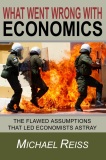Ever since Martin Wolf came out in favour of full reserve banking, there have been several follow-up articles (1,2,3) in which the authors
describe a move to full reserves as “banning banks”. I take issue with this...
When Dave Fishwick, made famous by the television series Bank of Dave, wanted to start his own bank, he was surprised to discover that
his proposed business of taking people’s savings and lending that money to
people that wanted to borrow it, was not allowed to be called a “bank”. I can
sympathise with Dave because by almost any definition of the word bank you may
find in a dictionary, his institution was most definitely a bank. It’s just
that the financial regulators have an unreasonably pedantic definition of the
word. Its as if the word “car” had been defined as a Volkswagen Golf, and any
“vehicle” that wasn’t a VW Golf was barred from calling itself a car, and had to be
advertised as a “motorised people transportation device”.
There are many precedents for dictionary definitions of
words being different from that which pedantic lawyers would insist upon. For example,
take Champagne and Velcro. Champagne is simply sparkling white wine, but woe
betide you if you make some white sparkling wine outside the Champagne region
of France and label your drink Champagne. Similarly with Velcro. If your “hook
and loop material” was not made by Velcro Corp. and you describe it in your
sales material as velcro, you will have a letter from their lawyers
soon after.
So if you are a pedantic lawyer type, then yes, full reserve
banking is indeed banning banks. But if you are a normal human being, armed
with a normal dictionary, then full reserve banking does not involve banning banks. It's merely switching to a different model of bank, like a different model of car.




No comments:
Post a Comment